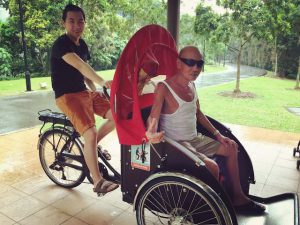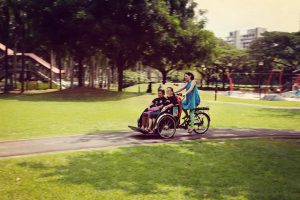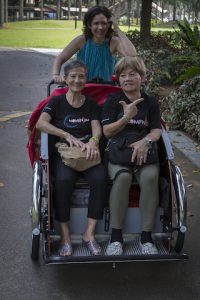Lifting spirits with a trishaw ride
A non-profit initiative looks at bringing seniors out of nursing homes on the trishaw and giving them “the right to wind in their hair”.
BY: Eleanor Yap
Trishaws, also called cycle-rickshaws or pedicabs, have long been a part of the streets of Singapore. According to the National Library Board’s Singapore Infopedia on Singapore’s history, culture, people and events, the trishaw was a popular mode of public transportation in the immediate years following the end of the Japanese Occupation (1942 to 1945) in Singapore, but started to suffer a decline in popularity from the mid-1950s onwards. And, by late 1970s, trishaw riders were regarded as a dying breed with most of them primarily involved in the tourism trade.
But if 35-year-old, mother of two Pernille Vederso Bussone from Denmark has her way, she hopes trishaws will continue to be a part of the Singapore landscape. She is doing all she can to achieve this and is using this mode of travel to bring seniors around and create bonding with volunteers and/or family members who serve as “pilots” or trishaw riders.
Through her non-profit initiative called Cycling Without Age, which was launched October last year, she is hoping to work with organisations related to seniors including nursing homes, as well as other pioneers in the community, and match volunteers so these seniors can go around the city, parks and along the waterfront, and enjoy each other’s company. She is eyeing corporate volunteers also to be pilots.
An initiative from Denmark
“Our initiative is all about connecting people with the community and lifting spirits,” said Pernille, who teaches sexual health in schools through her own company and does volunteer work with AWARE. Entrepreneur Ole Kassow, who is a friend of hers, started the initiative in Denmark back in 2012. He went to local nursing homes and invited the residents (some of whom have limited mobility) on trishaw rides. Since then, the initiative has spread to other countries including Austria, New Zealand, Canada, Chile, all over Europe including UK and some states in the US. According to the main organisation’s website, at present, more than 60 municipalities in Denmark offer Cycling Without Age from well over 350 rickshaws and the numbers continue to grow. Also, they have more than 2,500 volunteers who make sure the seniors get out of the nursing homes.
Pernille explained there have been many benefits to getting seniors on these trishaw rides. “Most of the nursing homes that Cycling Without Age works with have their own trishaws and found that it was a great investment. They used less medicine on those who have been on the rides, and the seniors had less aggression, slept better and ate more. There was also good results with those with dementia as they would open up and smile more, and be more talkative.”
It all started when she came to Singapore a year ago with her husband who is in the shipping industry, and one thing she enjoyed was cycling. “I thought I would be able to cycle in Singapore but I was disappointed. It is not as pleasant on the streets as I had thought as drivers are not used to cyclists and they drive very fast. I thought I either accepted this fact or make cycling a part of the community and get it more accepted and visible.” She chose the latter and started Cycling Without Age in Singapore and is the first Asian country to have this initiative.
She explained: “When you cycle, you become much more aware of your surroundings. There are so many details you tend to miss in a car. You are more connected to the people and the community, and you see them. For example, I can smell the durians in Geylang but if you are in a car, you wouldn’t be able to.”
Pernille also added that the trishaw was a natural choice. “Back in the old days, the seniors used to cycle a lot to get around and also took the trishaw to the market. Through these rides, we give them a connection to their past.”
Unforgettable sight
She has been working with Salvation Army Family Support Services for eight months and has been going out every Mondays for an hour with 86-year-old Annie Tan who was introduced by the centre. “When we go out, the community reaction is really magical. People stop us and talk to us, and people would look up from their screens,” Pernille shared.
One time, she added, when she rode with Annie, someone had noticed the trishaw tyres were a bit flat. He asked them to follow him to his flat so he could get his pump to pump the tyres. Another time, she shared that Annie saw a man fishing and she then asked him if he had caught any and how long he had been there. He ended up giving her the fish he caught!
Pernille remarked that Annie is very chatty and active, and she used to be a housekeeper for the British when they occupied Singapore. But the relationship has gone beyond just the rides – “She has made me food at her home such as popiah. She has also shown me her elegant Peranakan clothes as well as a box that hangs in her room to keep food cool and away from animals in the old days. I’ve also seen pictures of her aunt’s wedding where she was a small flower girl and pictures of her marriage. She has also shared about her stories such as losing her family members in World War II, including her mother, and her father then remarried. She has told me how it was not uncommon for men in those days to actually have two wives. She never had a helper and had four children. She also shared that she was living in the HDB area when the Bukit Ho Swee fire broke out.”
She has taken the grandmother of 12 on her weekly rides for almost three months. Said Annie: “I like going outside and if I stay at home, it gets boring as I live alone.”
Besides Annie, she has also picked up some seniors along the way including a brother and sister who got brought to the market in a trishaw to buy food.
Challenges
Though since starting the initiative, Pernille has had her share of challenges. She has managed to get a donation to buy a trishaw (which allows for two passengers) in June this year from a Danish university and hopes more corporates would come forward and donate so she could purchase more trishaws in other areas of Singapore, including in each HDB blocks so everyone can use them. A trishaw costs around S$6,000. Currently, the trishaw is parked at her flat or at the Salvation Army centre, and those who want to use it can only cycle within the area and along the park connectors.
Another hurdle she has is with her volunteers. As she has trained 15 volunteers on how to use the trishaw safely and about the guiding principle on slow cycling, most of them can only take the seniors out on the weekends due to work commitments. This poses a problem, as the Salvation Army centre is only open on the weekdays. That means Pernille is the only one using the trishaw. There are also issues that the centre has voiced including their reluctance to match seniors to volunteers that they do not know and worry about liabilities.
In addition, she said, “I have the idea, but I don’t have the contacts, business knowledge or the money.” Despite this, she noted a few positives that have resulted from her initiative including the non-profit Singapore International Foundation who is making a video of her initiative that will be used for crowdfunding purposes. She has also managed to get a bicycle mechanic, who has offered to maintain the trishaw for free.
And, she continues to have plenty of ideas to value-add to her initiative. “I want to work with local businesses so they can become part of the community. They can put the logo of Cycling Without Age on their shop doors and if the trishaw comes by, they could even offer coffee or whatever to the seniors as part of their corporate social responsibility.” Pernille also would like to reach out to schools and get students to ride with the seniors so they could share about the history of Singapore.
But she stops short of steering towards paid rides now or in the future, as a way to keep the initiative going. “People should not pay for the rides. I am using the principles from the Denmark model – it is really about the relationship between the passenger and the pilot.”







How can I get a tri-shaw in Colorado Springs?
Hey, Stan, you might want to check out the US chapters of Cycling Without Age – http://cyclingwithoutage.com – and see if they have a chapter in your area. All the best.